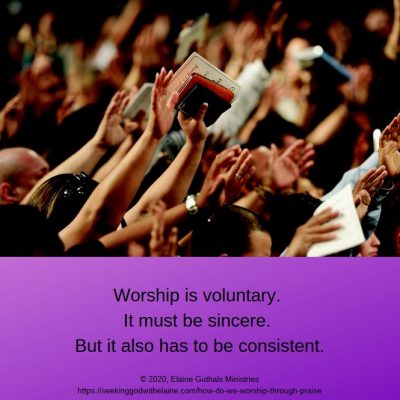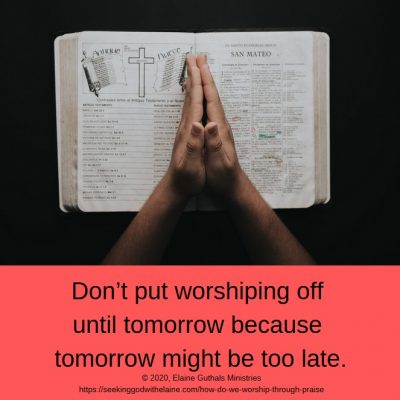One element of worship is praise. This devotion looks at different ways we praise God.
Nuggets
- Everyone is supposed to shout joyfully and triumphantly praising God.
- We worship God because we praise Him as Sovereign God.
- There are three types of worship: personal, family, and corporate.

One element of worship is praise. We can do a variety of things to express praise.
Let's Put It into Context #1
Worship, according to the Holman Bible Dictionary, is “Human response to the perceived presence of the divine, a presence which transcends normal human activity and is holy.”
Resource
According to the Holman Bible Dictionary, the Sabbath is “the day of rest, considered holy to God by His rest on the seventh day after creation and viewed as a sign of the covenant relation between God and His people and of the eternal rest He has promised them.”
Resource
Praise, according to the Holman Bible Dictionary, is our response to God “to proclaim His merit or worth.”
Let's Put It into Context #2
This psalm was written as a call to worship. The people had been exiled and the temple destroyed. Now, they were back, and the temple had been restored.
It was time to praise God again.
All Praise, All the Time
“Come, let’s shout joyfully to the Lord, shout triumphantly to the rock of our salvation! Let’s enter his presence with thanksgiving; let’s shout triumphantly to him in song” (Ps. 95: 1-2 CSB)
I am having a real hard time focusing my mind this morning, but the first thing that popped into my mind when I read this verse is that we are still in day seven of creation. We are still in the Sabbath.
We should still be praising God.
So, who is verse 1 talking about? That would be everyone. Everyone is supposed to shout joyfully and triumphantly praising God. Everyone is supposed to enter into His presence.
I hear you. Not everyone wants to enter into God’s presence.
But that is what He wants. “This is good, and it pleases God our Savior, who wants everyone to be saved and to come to the knowledge of the truth” (I Tim. 2: 3-4 CSB).
What do we not see in these verses? Along with not seeing this limited to specific people groups such as disciples, we don’t see it limited to a specific time.
We don’t see God saying this is a Sunday-morning-go-to-meeting response. It isn’t limited to when the church doors are open.
It is 24/7/365.
It is to be joyful and triumphant. That will bring us happiness and peace.
Tuck brought up an interesting idea. If there are limits as to who praises and gives thanks, we think it is limited to disciples. We think the non-believers can’t because God doesn’t accept it. Tuck argues that that notion is not scriptural.
I guess I can see that. It could be something as simple as an acknowledgement of a beautiful day. It could be a thankfulness that someone was healed or we were protected in an accident.
No, non-believers aren’t actively engaging in worship when they are doing that. They are, however, giving praise to the Creator.
Look at the first word of verse 1. Come. We are saying this to each other. It isn’t an edict from God.
Worship is voluntary. It must be sincere. But it also has to be consistent.
I know. That is where we get tripped up. We let this world worm its way in and steel our focus off of God.

Sovereign God
“For the Lord is a great God, a great King above all gods. The depths of the earth are in his hand, and the mountain peaks are his. The sea is his; he made it. His hands formed the dry land” (Ps. 95: 3-5 CSB)
We worship God because we praise Him as Sovereign God. We are to put Him above all other gods — even the gods of money and prestige.
Why is God a great God? Go back to verse 1 a second. “… the rock of our salvation!” (Ps. 95: 1 CSB). He is steady, and He is strong.
God doesn’t change. “God is not a man, so he does not lie. He is not human, so he does not change his mind. Has he ever spoken and failed to act? Has he ever promised and not carried it through?” (Num. 23: 19 NLT).
The greatness of God is also shown through His creation. He made the mountains (Amos 4: 13; Ps. 104: 8), the sea (Ps. 104: 6, Ps. 146: 6), and the dry land — and everything else (Ps. 90: 2; Ps. 104: 5). He continues to sustain and maintain it.
God is great because He alone is immortal. “He alone can never die, and he lives in light so brilliant that no human can approach him. No human eye has ever seen him, nor ever will. All honor and power to him forever! Amen” (I Tim. 6: 16 NLT).
We recently talked about the three omnis: omnipotent, omniscience, and omnipresent. God is all-powerful, all-knowing, and all-present.
To read a related devotion, click on the appropriate button below.
All Together Now
“Come, let’s worship and bow down; let’s kneel before the Lord our Maker. For he is our God, and we are the people of his pasture, the sheep under his care. Today, if you hear his voice: Do not harden your hearts as at Meribah, as on that day at Massah in the wilderness” (Ps. 95 6-8 CSB)
Look how verse 6 starts — verse 1 started the same way. “Come, let’s …” (Ps. 95: 6 CSB). Not you. Not I.
Us. This is worshiping together. Praising God together.
Spurt told us that there are three types of worship: personal, family, and corporate. We have to actively pay homage to our Sovereign God through all of these avenues of worship.
If we only worship in public but not privately — or vice verse (except when we physically cannot get out) — our worship isn’t truly genuine. When we do not share our worship with our family, we are not sharing the gospel in the way God has called us to.
Yes, we are called to corporate worship. “And let us not neglect our meeting together, as some people do, but encourage one another, especially now that the day of his return is drawing near” (Heb. 10: 25 NLT).
No, Jesus didn’t condone the religion of the Pharisees. He did not, however, shut down going to the synagogue.
Where verse 1 focused on the inward worship, verse 6 looked at the outward. shout joyfully and triumphantly. Bow down and kneel.
What does that tell us?
- Worship submissively.
- Worship reverently.
- Worship positively.
God can ask for and expect our praise because He is our Creator.
Maybe we all can’t literally bow down before God because of physical ailments. Every one of us can and must bow our hearts and our minds. We have to submit to His authority.
That is easy to do when we realize that God is worthy of our worship.
One day, we will all bow down.
- “By myself I have sworn; from my mouth has gone out in righteousness a word that shall not return: ‘To me every knee shall bow, every tongue shall swear allegiance’” (Isa. 45: 23 ESV)
- “For it is written, ‘As I live, says the Lord, every knee shall bow to me, and every tongue shall confess to God’” (Rom. 14: 11 ESV)
- “So that at the name of Jesus every knee should bow, in heaven and on earth and under the earth” (Phil. 2: 10 ESV).
I thought the “… Today, if you hear his voice: Do not harden your hearts …” (Ps. 95: 7-8 CSB) was interesting.
Today. We have the opportunity now. Don’t put worshiping off until tomorrow because tomorrow might be too late.

But every day is going to be today. We have to choose daily to worship Him. We have to choose minute by minute if we are going to follow His laws and commandments — which is a form of worship.
If we hear His voice says a lot. How many times are we so caught up in our physical life that we shut God out? We get on our hamster wheel and don’t let Him into our lives.
It is worse, though, when we harden our hearts. According to the Holman Bible Dictionary, hardness of the heart means “a stubborn attitude that leads a person to reject God’s will.”
Yep. Hardness of the heart is an attitude. It is a choice.
We choose not to hear God’s voice. We ignore the promptings of the Holy Spirit.
Making the Connections
Foster listed the elements of true worship.
- “Profound reverence”
- “Humility”
- “Submissive trust and love”
- “Humble hope.”
We show God’s merit when we give Him reverence. When we respond in humility, we show that we agree that He is higher than us. Our trust, love, and hope show how much we believe in His love and provision.
We are to worship the One true God on the Sabbath and at all times by proclaiming His worth to show that we are in a covenant relation with Him.
Making the Connections to Self-Discipline
Hardness of the heart is an attitude. It is a choice.
Don’t choose it.
But a circumcised heart needs to grow closer to God. That takes self-discipline.
We’ve been asking these questions all along so we can prepare for when we are asked. Here is the worksheet again. What would you say about praising God in our worship?
- What does the Scriptures say?
- What do I believe?
- Why do I believe the same/differently than the Scriptures?
- What are the talking points when witnessing to a non-believer?
Related Links
I have created a worksheet of the questions above. Click on the button below to access it.
How Do We Apply This?
Spurt made an excellent observation. He wrote, “Worship only begins when faith acknowledges the Almighty Creator: it dies away as faith in Him decays; it dies away as He gives place in thought to some purely human imagination respecting how the universe came to be what it actually is.”
Liddon expanded that. He reminded us that worship ours us in the presence of God. He wrote, “The very first effort of worship implies that God is resuming, has resumed, His true place in our thoughts, that He is no longer jostled out of our mental life by a hundred puny worthless rivals belonging to the world of sense.”
Foster had a good reminder. “As the face is the index of the emotions, so outward acts are the index of the spiritual feelings within.” Our demeanor must show our reverence to God when we worship Him in praise.
Sincere worship through praise will help solidify our relationships with God. This will help as we fight the spiritual warfare in our lives.
Father. We praise Your holy name. We thank You for creating us, loving us, and protecting us. Help us to be more like You. Amen.
What do you think?
Leave me a comment below (about this or anything else) or head over to my Facebook group for some interactive discussion.
If you don’t understand something and would like further clarification, please contact me.
If you have not signed up for the email daily or weekly providing the link to the devotions and the newsletter, do so below.
If God has used this devotion to speak with you, consider sharing it on social media.
Pingback: How Are We to Be Inclusive in Our Worship? – Seeking God with Elaine
Pingback: Forever Worshiping Our Lord – Seeking God with Elaine
Pingback: How Do We Keep the Sabbath Holy? – Seeking God with Elaine
Pingback: Using Worship to Educate Our Thoughts – Seeking God with Elaine
Pingback: Honoring the Lord through Worship – Seeking God with Elaine